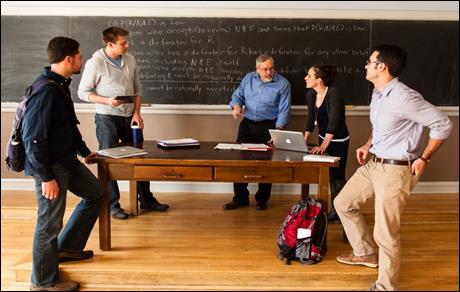
The Marks of a Christian Scholar: A Vocational Description (Part Four)[1]
Mark Eckel, ThM PhD, Professor of Leadership, Education & Discipleship
Capital Seminary & Graduate School, Washington, D.C.
By what means will I be evaluated? What will someone identify to show that I am a Christian scholar-teacher-discipler?[2] How will I know if my professorial life conforms to a standard?
Assessment questions haunted me during my PhD research. Validation is imperative in any scientific pursuit. But how could I objectivize outcomes that would lead to quantitative proof in an obviously qualitative endeavor? The literature review provided evidence. Others had been asking the same questions.[3]
During my tenure as dean and then vice president of academic affairs[4] I began to establish a written essay approach to professor evaluations. We spent a good deal of time together as faculty[5] inside and outside of school. From other reading, I added to what I had discovered from others, developing a qualitative assessment rubric for college faculty. I believe that this process could benefit our interest in developing scholar-teacher-disciplers in Christian higher education.
Christian College Faculty Yearly Assessment

Preamble: Christian faculty are committed to training Christian leaders. Since Christian professors’ focus is on pedagogy (“training youth”), andragogy (“training adults”) and students (“training leaders”), any assessment of an instructor’s teaching must ultimately concern itself with development of the whole person. “Measurement” of “performance” is not simply quantifiable (driven by numbers). From a biblical point of view, qualitative evaluation sees not only the results lived in life but wisdom born within one’s life. Faculty need to live in community to encourage personal growth as well as knowing the impact of one’s classroom teaching. Professorial assessment, then, will strive to be biblically wholistic.
The Christian faculty member, in his or her thinking-being-living, should demonstrate:
- Content Knowledge—
- interaction with the latest thinking-writing in a field of study
- substantive understanding of past and present practitioners, practices, discussions
- theological foundations and assumptions of their discipline
- understanding how a discipline’s methodology impacts a discipline’s outcomes
- seeks to show students how biblical eschatology and teleology should frame and focus the reason and content of the teaching
- Curricular Development—
- assessment of content (for students):
- knowing when/why students are having trouble learning
- differentiation in evaluation, variation in assessment
- focus on the process of education so as to give students tools of learning
- scope and sequence of content—demonstrates an overview
- school mission permeates programs, philosophy, objectives, methods, outcomes.
- assessment of content (for students):
- Communication—
- worldview comparison: clear demonstration of biblical Christianity contrasted with subject of study
- understands how the medium may shape the message of the teaching
- application of content to daily life and culture
- vertical-horizontal integration, including disciplines outside the subject
- authentic, matching methods in relation to the program or subject of study
- discovery learning; andragogy focused on the student
- sensitivity toward student-learning and personal learning styles
- a safe classroom environment for discussion is maintained
- Creativity—
- faculty teaching is not static, rather evidences constant growth in the teaching-learning process, including methodological development
- affective student integration focused on developing students’ interiority
- faith-learning thoughtfulness demonstrated through writing assignments
- Conduct—
- biblical behavior which befits a Christian professor
- open, forthcoming, initiated rapport with students outside of class
- mentorship-discipleship possibilities are encouraged by professor
- care and concern is evidenced toward all
- office hours and appropriate time for research off campus are maintained
- Character—
- consistent, evident biblical growth as a Christian in community
- “habits of the heart” are witnessed from syllabi to exams to office to life
- seeks internal motivation for him or herself as well as students
- Continuance (of teaching-with-learning)—
- self-evaluation is shown through living-teaching
- peer cooperation through cross-disciplinary engagement
- student evaluations will be carefully calibrated within a broad evaluation scope
- student mentoring and study groups are encouraged
- alumni surveys are sought to consider the longevity of instructional value
- communal interdependence encourages teachers to learn from students
- internship programs and practicums are encouraged
- lifelong student learning is practiced
- Collaboration with colleagues—
- works with administrative expectation for the furtherance of the school’s mission
- practices co-evaluation within the faculty
- exhibits a teachable spirit
- learning communities are maintained for the cross-pollination of ideas
- participation in disciplinary societies and groups
- addresses given, papers delivered, reviews written, books crafted
- online presence (website, Facebook, YouTube, etc.)
- Collegiality—
- interpersonal relationships with other colleagues should exude trust and joy
- generosity of spirit toward all who support the educational process
- Community—
- participates with institutional events
- takes an active part in the school culture
- attends and is a member of good standing of an Evangelical local church
- attends and/or participates in other churches periodically to develop a broad perspective of The Body of Christ within a multiethnic mindset

New College Oxford. http://www.new.ox.ac.uk/. Accessed 4/2/2014. Note: Developing a Christian Mind at Oxford Series. Editor’s note: Click here for all the posts in Mark Eckel’s The Marks of a Christian Scholar: A Vocational Description series.
Notes
- Dr. Eckel has served the Christian educational community for over 30 years; teaching junior high through graduate school. He speaks widely and writes weekly at www.warpandwoof.org. I Just Need Time to Think! Reflective Study as Christian Practice (Westbow, 2014) is his latest book. Dr. Eckel is presently at work writing a book about movies. Mark can be found on Facebook, Twitter (@MarkEckel), and Linked In. Dr. Eckel believes that collegial comaraderie can be maintained within a college community. Mark and Robin Eckel live in Indianapolis, IN, sharing their gifts in their local church, Crossroads Community, Fishers, IN.↩
- See Parts 1-3 of this series.↩
- Points 1, 3, 5, 7, and 8 in the list came directly from the literature review found in my dissertation, “A Comparison of Faith-Learning Integration Between Graduates of Christian and Secular Universities in the Christian School Classroom,” Southern Baptist Theological Seminary, 2009, pp. 101-02. Each part of the outline was augmented by further reading and research.↩
- 2010-14 at an undergraduate institution, Crossroads Bible College, Indianapolis, IN.↩
- I taught 12 hours per semester in addition to my oversight responsibilities.↩
Dr. Mark Eckel is adjunct professor for various institutions, President of The Comenius Institute (website), spends time with Christian young people in public university (1 minute video), hosts a weekly radio program with diverse groups of guests (1 minute video), interprets culture from a Christian vantage point (1 minute video), teaches weekly at his church (video) and writes weekly at his website warpandwoof.org.

Leave a Reply